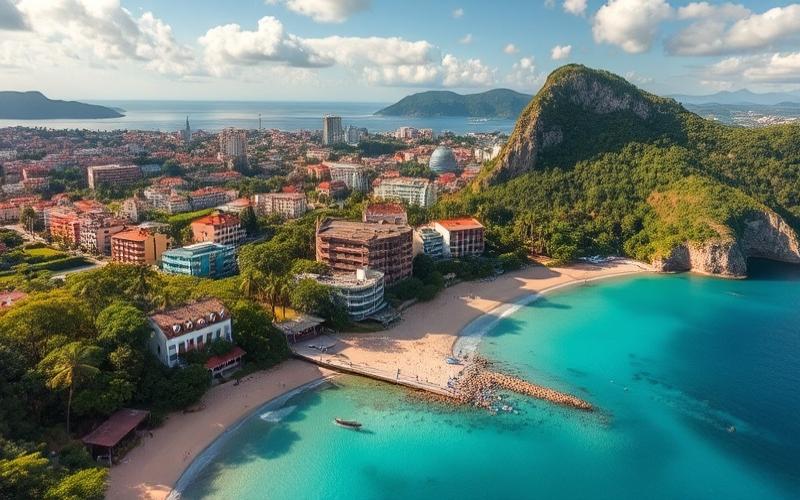
 Published on and written by Cyril Jarnias
Published on and written by Cyril Jarnias
Navigating the Brazilian healthcare system as an expatriate can be an intriguing challenge filled with unique cultural and administrative complexities. Brazil, with its large public healthcare system known as SUS (Unified Health System), provides free care to anyone legally residing in the country.
However, for many expatriates, private health insurance becomes an indispensable option, allowing for faster and often higher-quality access to care.
This article explores different aspects of available healthcare services, detailing the steps to access this care, and providing practical tips for dealing with potential challenges in this vast country with diverse medical resources.
Accessing Quality Healthcare in Brazil: Myth or Reality?
The Brazilian healthcare system operates on two distinct levels: the public sector (Unified Health System – SUS) and the private sector.
| Feature | Public System (SUS) | Private System |
| Accessibility | Free and universal | Paid, by subscription |
| Quality of Care | Variable, often uneven | High, modern equipment |
| Wait Times | Long, waiting lines | Short, quick service |
| Cost for Expatriates | Free (with paperwork) | Very high without insurance |
| Language | Primarily Portuguese | Sometimes bilingual staff |
Accessibility for Expatriates:
- SUS is accessible to all residents, including expatriates, provided they obtain a CPF number (equivalent to a tax ID) and register with a local health center.
- Access to private care requires private health insurance (local convênio or international insurance). Costs are very high without adequate coverage: a simple private consultation typically costs between $160 and $270.
Service Quality for Foreigners:
Private hospitals and clinics offer high-quality services, often comparable to those in developed countries, with reduced wait times and modern equipment.
The quality of care in the public system varies greatly by region; major cities sometimes have good infrastructure, while rural areas remain underserved.
Expatriates almost systematically prefer the private sector to guarantee speed, comfort, and quality.
Challenges in Accessing Quality Care:
- Significant wait times in the public system, sometimes several weeks or months for specialists.
- Language barrier: most healthcare professionals only speak Portuguese, even in private facilities.
- Prohibitive costs in the private sector without appropriate insurance.
- Local insurance sometimes insufficient to cover all expenses, especially for major treatments or extended hospital stays.
Administrative Requirements:
- For public care: legal residency, CPF, SUS registration.
- For private care: subscription to local or international private insurance. Expatriates often choose international health insurance or CFE (Caisse des Français de l’Étranger) coupled with supplemental insurance.
- Most Brazilian employers offer private health insurance to their employees, but it doesn’t always cover the entire family or all medical procedures.
Expatriate Testimonials:
Several expatriates report that “it’s imperative to get insurance before going to Brazil” and that “private care is excellent but extremely expensive without insurance.”
Many mention positive experiences in the private sector but difficulties in the public system: “Endless waits, lack of doctors, but quick and effective care in the private sector as long as you’re well insured.”
Some also mention the language barrier: “Few doctors speak English or French, even in São Paulo.”
Comparison with Home Country Healthcare Systems (France, Canada, etc.):
| Aspect | Brazil (Private) | France/Canada (Public) |
| Consultation Price | $160-270 | $27-32 |
| Access Times | Fast | Variable |
| Quality | High (private) | High (general) |
| Free Care | No (private) | Yes (public) |
| Language | Portuguese | French/English |
Recent Statistics on Expatriate Satisfaction:
Approximately 70% of expatriates report being generally satisfied with the quality of private care, but less than 30% recommend using SUS for important treatments.
Main concerns: insurance costs, access to specialists, quality of care outside major cities, language barrier.
Main Health Concerns for Expatriates in Brazil:
- Access to consistently quality healthcare throughout the country
- Tropical infectious risks (dengue, zika, chikungunya)
- Coverage for emergency medical expenses
- Access to mental health services and specific medications
Key Takeaways:
To benefit from quality healthcare in Brazil, expatriates are strongly advised to purchase international health insurance before departure. The public system is accessible but limited, while the private sector offers excellent services provided you have the means or appropriate coverage.
Good to Know:
Expatriates in Brazil often need to turn to private insurance to access quality care, as public hospitals are overcrowded and primarily used by the local population; according to a recent survey, 65% of expatriates are satisfied with private care, although cost and administrative procedures remain their main concerns.
Planning Your Healthcare Budget: Practical Tips
Typical Healthcare Costs in Brazil for Expatriates:
- Private medical consultations: between $160 and $215, sometimes more in certain cases or major cities.
- Hospitalization: can reach several thousand dollars depending on the procedure.
- Medications: highly variable prices; some common medications cost less than in Europe, but specialized treatments are expensive.
- Local/international health insurance:
- Local private insurance (planos de saúde): monthly rates often between $65 and $270 per person depending on age and coverage level.
- International insurance or CFE with supplemental: average budget around $160 to $430 per month for good coverage.
| Care/Service | Estimated Cost (USD) |
|---|---|
| Private general practitioner consultation | 160 – 215 |
| Private specialist | >215 |
| Hospitalization | Several thousand |
| Common medications | Variable, sometimes <$11 |
| Specialized medications | Up to several hundred |
| Planos de saúde (monthly) | 65 – 270 |
| International insurance (monthly) | 160 – 430 |
How to Choose the Right Health Insurance?
- Assess your actual needs: frequency of consultations, medical history, family members’ ages.
- For long stays (>1 year), consider combining CFE + local supplemental insurance which also maintains rights continuity in France.
- Verify if the insurance offers a partner network allowing direct payment for unexpected hospitalizations.
- Learn about the waiting period before full contract activation.
- Adapt your coverage to specific household needs (maternity, vision/dental…).
Tips for Saving on Costs While Maintaining Quality
- Use telemedicine services included in some insurance plans or offered by certain private clinics.
- Look for partner clinics offering preferential rates to expatriates through agreements with international/local insurers.
- Purchase medications at affiliated pharmacies or take advantage of cheaper Brazilian generics when available.
- Ask other expatriates about their good local medical contacts.
⚠️ It’s essential to budget for a dedicated reserve for unexpected medical care—unplanned consultations, urgent exams, or sudden hospitalizations can cost several thousand dollars without complete insurance.
⚠️ Recommended vaccines (yellow fever, hepatitis A/B…) should be anticipated before departure; include their cost (~$55–$110 per vaccine) in your overall annual health budget.
Checklist
- Systematically compare local/international/CFE + supplemental offers according to family/professional profile.
- Prioritize insurance that fully covers hospitalizations and major procedures even with high deductibles for minor routine care: this is where major financial risks are concentrated.
- Use teleconsultations when possible to avoid costly/unnecessary trips to general practitioners/specialists;
- Include mandatory/recommended vaccine costs in your setup budget;
- Request direct feedback/advice from established French/Brazilian communities locally.
Good to Know:
To effectively manage your healthcare budget in Brazil, compare prices between free SUS and private care, consider appropriate health insurance including telemedicine, and check clinics with reduced rates for expatriates; don’t forget to include vaccinations in your budget and set aside a reserve for medical emergencies.
Top Private Clinics for Expatriates
Expatriates in Brazil face major healthcare challenges: high costs in the private sector, uneven infrastructure quality across regions, specific health risks (tropical diseases, isolation-related stress), and language barriers. The public system (SUS) offers free coverage but suffers from long waits and saturated infrastructure. Therefore, turning to private clinics is common to guarantee speed and efficiency.
Essential Criteria for Choosing a Quality Private Clinic:
- International accreditation (JCI, ISO)
- English-speaking medical staff
- Availability of specialized services (cardiology, pediatrics, surgery)
- Geographic proximity to major urban centers
- Modern medical technologies
- Customer service adapted to expatriates (administrative support)
Recommended Private Clinics for Expatriates in Brazil:
| Name | Location | Main Specialties | Expatriate Testimonials |
|---|---|---|---|
| Hospital Albert Einstein | São Paulo | Cardiology, oncology, pediatrics; JCI accreditation; English-speaking team available | “Exceptional welcome; highly competent doctors.” |
| Hospital Sírio-Libanês | São Paulo | General and specialized surgery; internal medicine; international VIP service | “Great responsiveness during a medical emergency.” |
| Clínica São Vicente | Rio de Janeiro | 24/7 emergency care; maternity; specialized consultations | “Quick and reassuring care.” |
| Hospital Moinhos de Vento | Porto Alegre | Neurology; orthopedics; international patient center | “Simplified administrative process for foreigners.” |
Health Insurance:
- It’s essential to have international health insurance, as CFE alone doesn’t cover all expenses.
- Most major Brazilian private clinics work with international insurers such as Allianz Worldwide Care or Cigna.
- Some offer dedicated support to facilitate administrative processing with your insurer.
Practical Tips for Administrative Management When Accessing Care:
- Always verify if your insurance covers chosen facilities before any consultation or hospitalization.
- Prepare your administrative documents in advance: passport, international insurance card, medical records.
- Contact the foreign or international patient service upon arrival at the clinic.
- Only use providers with English or French speaking staff to avoid any medical or financial misunderstandings.
- Anticipate direct payment: some facilities require an initial deposit before treatment if agreement with the insurer isn’t immediate.
Personalized follow-up via WhatsApp is sometimes offered by certain high-end clinics: don’t hesitate to request this service which facilitates post-consultation communication.
Brazilian private care is renowned but expensive: thorough preparation regarding insurance and administrative documentation will save you many difficulties.
Good to Know:
To choose a quality clinic in Brazil, prioritize those with international accreditation, like Hospital Sírio-Libanês in São Paulo, with English-speaking staff and a wide range of specialized services; ensure your insurance covers these facilities often partnered with global insurers.
Disclaimer: The information provided on this website is for informational purposes only and does not constitute financial, legal, or professional advice. We encourage you to consult qualified experts before making any investment, real estate, or expatriation decisions. Although we strive to maintain up-to-date and accurate information, we do not guarantee the completeness, accuracy, or timeliness of the proposed content. As investment and expatriation involve risks, we disclaim any liability for potential losses or damages arising from the use of this site. Your use of this site confirms your acceptance of these terms and your understanding of the associated risks.


























































